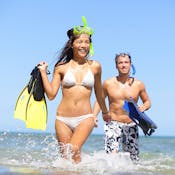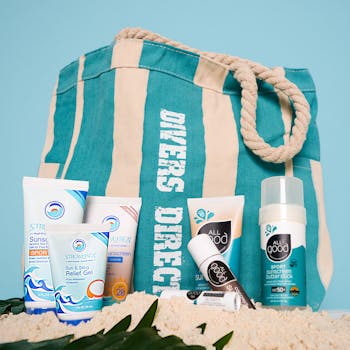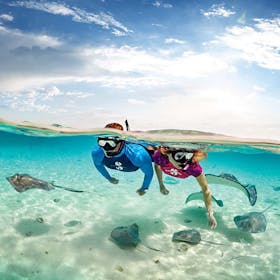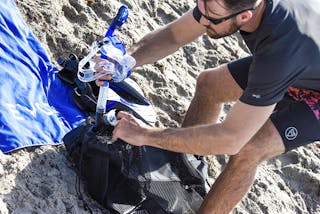Level Up Your Snorkel Life

How to take your snorkeling skills from beginner to advanced

You may be finding that you’re grabbing your mask, fins, and snorkel and heading to the water more frequently. We totally understand, the sea is always calling to be explored. Or maybe you’re about to embark on your very first snorkel adventure and you want to be just as prepared as someone who has snorkeled all over the world. Either way, we’ve got you covered with the following “Pro Tips” on how to level up your snorkel life.
Here is the biggest “pro tip” of all for anything: It’s okay to be a beginner at something. Beethoven was once a beginner pianist. Van Gogh was once a beginner artist. Kelly Slater was once a beginner surfer, and so on. If you show up with an open mind to learn and the patience to practice, you’ll grow in whatever it is you do—including snorkeling.
PREP TIPS:
As a snorkeler, you’ll likely already have the basic gear—mask, fins, snorkel, and something to wear to snorkel in. If not, these are items that are essential to the activity, and while you can rent these items on snorkel charters (everything except ‘something to wear’), “leveling up” will mean investing in your own gear. You may be finding your snorkel sessions right off the shoreline or maybe you already jump in on snorkel charters or tag along with shallow water divers to get your adventure fix in. However or wherever you snorkel, there are a few additional things to add to your snorkeling gear bag to be a well prepared snorkeler.
First, let’s talk about the sun. As you know, your backside is often exposed to the sun for nearly your entire snorkeling adventure. Even with sunscreen, you’ll be getting some tan time while you’re out. So, what’s the best way to handle all that sun exposure? Well, someone who spends any time in the water needs to be concerned about what they’re bringing into the water with them. To be more transparent about what we mean, check out your current sunscreen. If it’s chock-full of chemicals and ingredients you can’t even pronounce, it’s time to trade out that toxic goo for some reef safe sunscreen. Reef safe sunscreen not only protects the ocean’s inhabitants but it’s much less toxic for you as well! So, if you’re going to be coating on some sunblock before you jump in, use something both you and the fishies would prefer.
On another note about sun protection, whether you live by the sea and snorkel often, or if you’re heading off to a week long vacay for a whole lot of snorkel fun, a sweet sun balancing trick for multi-day adventuring is to wear a long sleeve rashguard and either boardshorts or bikini bottoms one day, then the next day just wear your bikini top, tank top, or go shirtless, with full leggings on. That way, your kissed-by-the-sun skin can heal on one part of your body while you balance out the tan on the other end.


You’ll be surprised at how a mixture of saltwater and consistent activity, even a leisurely activity like snorkeling, will take a toll on your hydration and energy. In order to stay healthy and hydrated, you’ll need to have an adequate amount of drinkable water with you (ideally housed in an insulated and reusable water bottle. It’s also a grand idea to keep a light snack or two in your bag, especially if you’re taking on multiple snorkeling trips in one day.
If you’ve ever done any kind of water activity from a boat or from the shore, you know that keeping your belongings dry is almost futile. Notice we said, almost. Since there are some bits of your belongings that you simply can’t risk getting wet like your phone, wallet, key fob, and other items, you’ll need a dry bag (or box) to keep them in for optimum security. Ideally, you’d want to travel light and leave as much of your personal belongings at home as you can, but sometimes that’s just not an option. So make sure you if you do bring these things that they’re safe and protected.
And, of course, you’ll need a gear bag to carry all that in. You’re not going to waddle down the dock or shore with all your clothes, towel, fins, snorkel, water bottle, snacks, etc. fumbling around in your arms, are you? A simple mesh bag* can do the job, but you may find that some organization with a pocket or two here and there could be beneficial for snack and/or sunscreen storage.
*Mesh bags are ideal for helping your gear dry faster
What else is in your bag? Well, so far you’ve got your mask, snorkel, fins (tip: slap some stickers on your fins and snorkel to help personalize them—this is especially useful when snorkeling in big groups), sunscreen, water, and other accessories like a neoprene mask strap, a spare mask strap, a snorkel keeper, and, of course, some mask defogger.
But collecting all the gear and gadgets can be achieved by any hyper-planning adventurer. What really makes the difference between a newbie and a pro is your actual adventure preparation. Here are some questions to ask yourself on the morning of your snorkel session before you even get on the boat or head to the beach:
What’s the weather like? The wind speed? Water conditions? Any boating advisories? What’s my snorkel location like? Are there certain potentially dangerous wildlife that hang about this area? How will high tide or low tide affect my location and what are the tide times? How will you be traveling to your destination—boat, beach, kayak? Do you have everything you need for your transport to the location—gas, a dive flag, a leash to stay connected to your kayak or paddleboard? All of this premeditated knowledge will give you a better understanding of how your experience will be. If the water is choppy but not too rough to skip the trip, it may be wise to take some anti-nausea precautions* before getting out on the water. Is it too choppy to snorkel? Maybe tomorrow will be better.
*Always check with your doctor before taking any medications
The weather can be fairly easy to determine whether or not it’s snorkel appropriate. Ideally, you don’t want to snorkel on a gloomy, rainy, windy day, since visibility will be affected by these factors. A snorkel trip should always be cancelled if there is lightning in the forecast. The ideal weather for a snorkel trip is clear, bright skies, little wind, and calm seas. Get in the habit of checking the weather and water conditions before any adventure to the sea.
SNORKEL LIKE A PRO TIPS:
- Get a snorkel buddy - Anyone who’s been around the reef a time or two knows that adventuring with friends is the way to go. Not only is it safer, it’s much more fun! You have more than your own set of eyes looking around and pointing out cool, amazing things, and if an emergency were to happen, you’d be able to help each other out.
- Look around - This is a pro tip for any and all ocean explorers. You may think it would be natural to just “look around”. That’s the idea of the activity, right? While it’s true that you’ll be looking around already, you need to not only look around in wonder, you need to look around in caution. Keeping a calm sense of vigilance in the water could make a great deal of difference in your experience. We know you want to closely watch that octopus stroll along the reef, but while you’re watching it, take a moment to look left, right, and behind you to a) make sure there are no dangerous creatures getting too close for comfort, and b) check on your snorkel buddy to be sure they’re doing okay as well.

- Don’t touch or take - We hope you’re aware of this already, but in case no one’s told you yet, don’t step on the reef, don’t touch the coral, don’t feed the fish, and especially don’t touch anything you’re not familiar with. One of the best things you can do to snorkel like a pro is become more familiar with marine wildlife, especially for the area you’ll be snorkeling. There are fish identification cards to help you study the names of certain fish in your region, but get as much research in as you can so you know what’s poisonous, what’s friendly or unfriendly, and what sort of predators to look out for. And unless it’s trash, leave everything where you found it - in the sea! That includes seashells, sand dollars, and every other natural thing you find down below. Of course, upon seeing any trash or plastic, if you can safely get to it, grab it and bring it back with you to be properly disposed of.
- Conserve your energy - Think of your adventure like a marathon, not a sprint. Sure, you want to see all there is to see as fast as you can, but you can end up overexerting yourself and having to call it quits sooner than you’d like if you don’t take your time and find a relaxed pace.
- Know your limits - A good snorkeler knows when they’re tired and rests, but a great snorkeler already knows their limits. What’s the difference? The good snorkeler just goes and goes until they can’t anymore, and while you’re respecting your exhaustion and resting once you get to that point, there are some dangers in doing that. For one, your body could cramp up and prevent efficient swimming which would be problematic in the event of heavy currents. A great snorkeler has a deep understanding of their personal physiological uniqueness and ensures they have conserved enough energy (see above) to prevent overexhaustion from ever even happening. If you know you’re not the strongest swimmer or tend to get tired fairly quickly, one way to honor your limits in that regard is to get a snorkel vest or even using an additional floating device.
POST ADVENTURE TIPS:
After you get out of the water, you’ll be ready to relax and reminisce on the amazing time you just had (perhaps reviewing all the footage you got with your underwater camera, but you don’t want to be cold and wet the whole way home. Unless you happen to be one of those lucky folks that live right on the beach and go snorkeling in your backyard, you’ll need to pack something dry and comfortable to change into once you get back on the boat or back on land. And, of course, you’re going to need a towel to help out with that particular transition.
Our final tip: It’s always a great idea to rest after your adventure, perhaps over a big meal with all your snorkel buddies!
Written by Amy Baldacci


